Looking for the best CMS for SEO? Here's a quick breakdown of the top platforms:
| CMS | Best For | Starting Price |
|---|---|---|
| WordPress | Small-medium sites, blogs | Free + hosting |
| Drupal | Large complex sites | Free + hosting |
| Webflow | Design-focused sites | $12/mo |
| HubSpot | Marketing sites | $25/mo |
| Wix | Small business | $16/mo |
| Squarespace | Portfolio sites | $16/mo |
| Shopify | Online stores | $29/mo |
Here's what each platform does best for SEO:
WordPress: Powers 43% of all websites. Best for blogs and small businesses. Tons of SEO plugins like Yoast.
Drupal: Perfect for big sites that need tight security. Built-in SEO tools, no plugins needed.
Webflow: Clean code and fast loading. Great for designers who want SEO control.
HubSpot: Built-in marketing tools + SEO features. Pricey but powerful.
Wix: Simple SEO tools for beginners. SEO Wiz helps optimize pages.
Squarespace: Basic SEO features. Good for portfolios and small sites.
Shopify: Built for online stores. Product SEO tools included.
Quick Comparison:
| Feature | WordPress | Drupal | Shopify |
|---|---|---|---|
| URL Control | Full | Full | Limited |
| Meta Tags | Yes* | Yes | Yes |
| Mobile Support | Yes* | Yes | Yes |
| Auto Sitemaps | Yes* | Yes | Yes |
| SSL Support | Yes* | Yes | Yes |
*Requires plugins
Pick WordPress if you want flexibility, Shopify for online stores, or Drupal for complex sites. Each platform handles the SEO basics - the difference is in how much control you need.
Related video from YouTube
WordPress
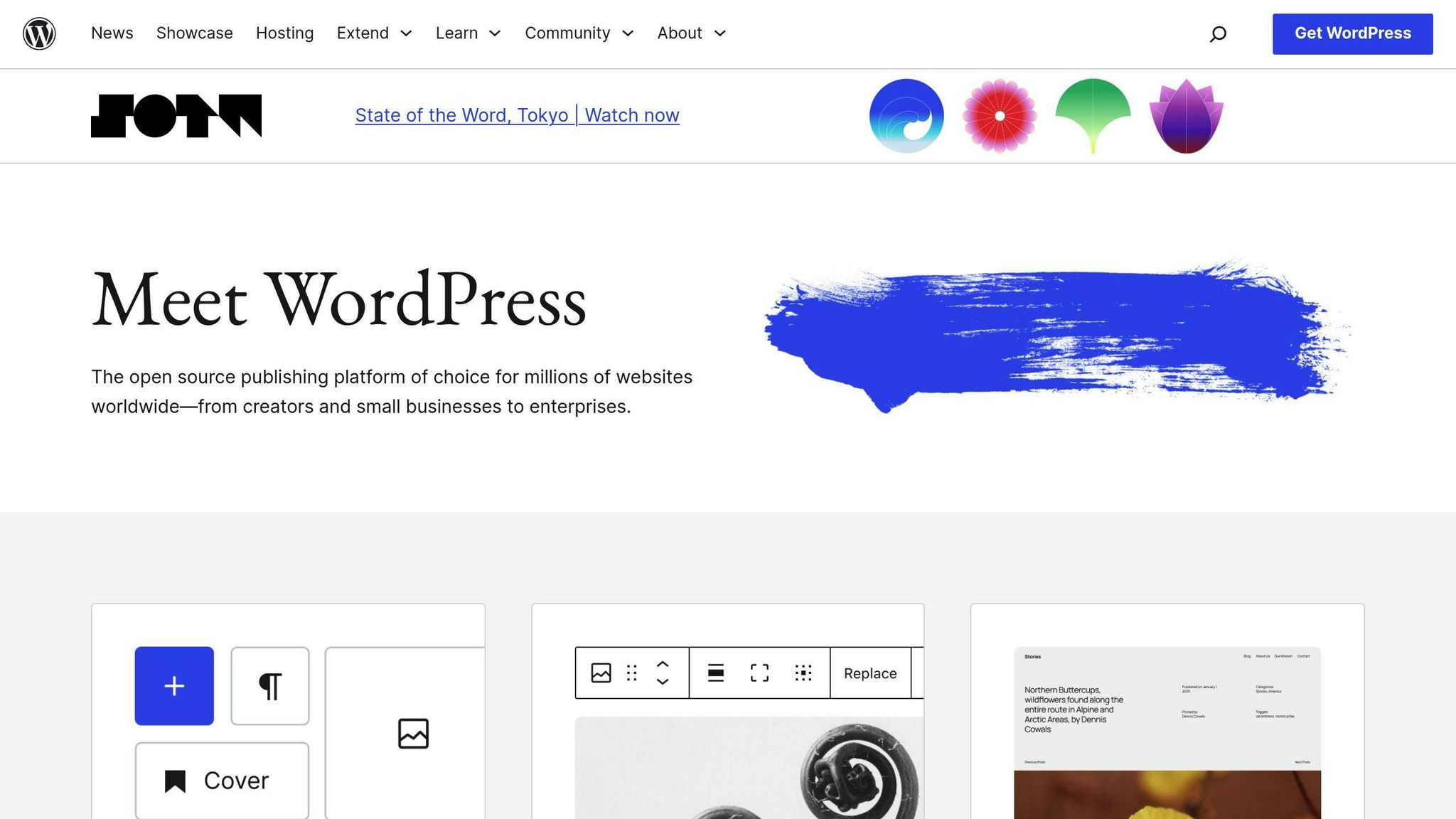
WordPress dominates the CMS market, powering 43% of all websites. Here's what it offers for SEO:
| Feature Category | Key SEO Capabilities |
|---|---|
| Built-in Tools | - Custom URLs and permalinks - Meta tags and descriptions - Image alt text - Mobile-responsive themes |
| Technical SEO | - XML sitemaps - Robots.txt control - Schema markup support - Clean code structure |
| Speed Options | - Caching plugins - Image optimization - Code minification - Server-side improvements |
Want to boost your WordPress SEO? Here are the top plugins:
| Plugin | Features | Price |
|---|---|---|
| Yoast SEO | - Content analysis - Meta tag control - Internal linking tools |
Free / $99 per year |
| All in One SEO | - TruSEO analysis - WooCommerce tools - Rich snippets |
Free / $49.60 per year |
| RankMath | - Content optimization - Schema markup - SEO analysis |
Free / $59 per year |
Here's something scary: Google's data shows that if your page takes 3 seconds to load (instead of 1), you'll lose 32% of your visitors. But don't panic - WordPress has you covered with caching plugins like WP Rocket ($59/year).
For mobile SEO? WordPress themes are mobile-ready out of the box. That's HUGE because Google now looks at your mobile site first when deciding rankings.
"Yoast SEO isn't just a plugin - it's the #1 SEO plugin on the WordPress market." - WPBeginner
What's new for 2024:
- AI tools for meta descriptions
- Advanced schema markup options
- Better Core Web Vitals scores
- Enhanced mobile optimization
The best part about WordPress? You can control EVERY SEO element from your dashboard or through plugins. And with its massive community, you'll get fresh SEO features and updates all year long.
2. Drupal
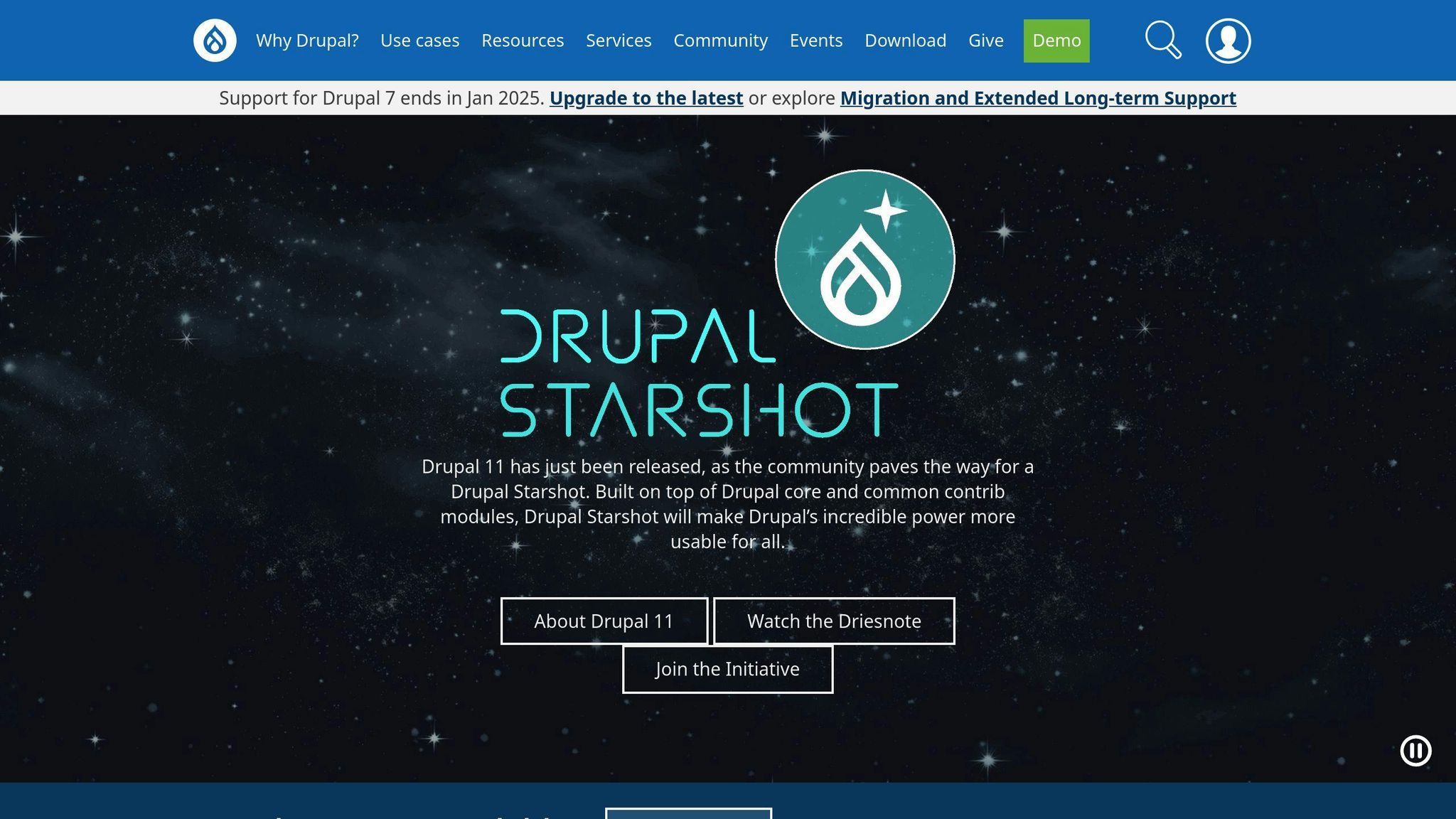
Drupal runs 6.42% of the top 10,000 websites, including giants like General Electric, United Nations, and Lenovo. Here's what it does for SEO:
| Feature Type | SEO Capabilities |
|---|---|
| On-Page Tools | - Metatag module for meta descriptions - Schema.org module for structured data - Real-time SEO analysis - H1 tag-based URL generation |
| Technical SEO | - XML sitemap generation - 301 redirect management - Clean URL structure - Robots.txt control |
| Speed Tools | - Advanced CSS/JS aggregation - Browser caching - Image optimization - Code minification |
Let's look at the top SEO modules for 2024:
| Module | Function | Impact on SEO |
|---|---|---|
| Metatag AI | Creates meta descriptions automatically | Boosts click rates |
| Link Checker | Finds broken links | Keeps site authority high |
| SEO Checklist | Monitors SEO tasks | Follows SEO standards |
| Pathauto | Makes SEO-friendly URLs | Helps Google crawl better |
Here's how to boost your Drupal SEO now:
1. Start with core modules
Get Metatag, Pathauto, and XML Sitemap up and running. These handle the SEO basics Google wants to see.
2. Make your site faster
The Advanced CSS/JS Aggregation module can cut load times by 30-40%. That's a big deal for SEO.
3. Go mobile-first
Drupal 8/9 comes ready for mobile. With Google's mobile-first indexing, you NEED this for good rankings.
What makes Drupal different? Its node system lets you build complex content connections - perfect for big stores or directories that need solid internal linking.
Here's a bonus: Drupal's tough security makes it the #1 choice for government sites and big companies. No SEO penalties from security issues here.
| SEO Task | Drupal Module | What You Get |
|---|---|---|
| Meta Tags | Metatag | Custom tags for each page |
| URLs | Pathauto | Clean URLs with keywords |
| Speed | Adv CSS/JS Agg | Pages that load faster |
| Content | Real-time SEO | Tips to improve pages |
Bottom line: WordPress might be more popular, but Drupal's SEO tools work better for big, complex sites that need tight security and smart content linking.
3. Webflow
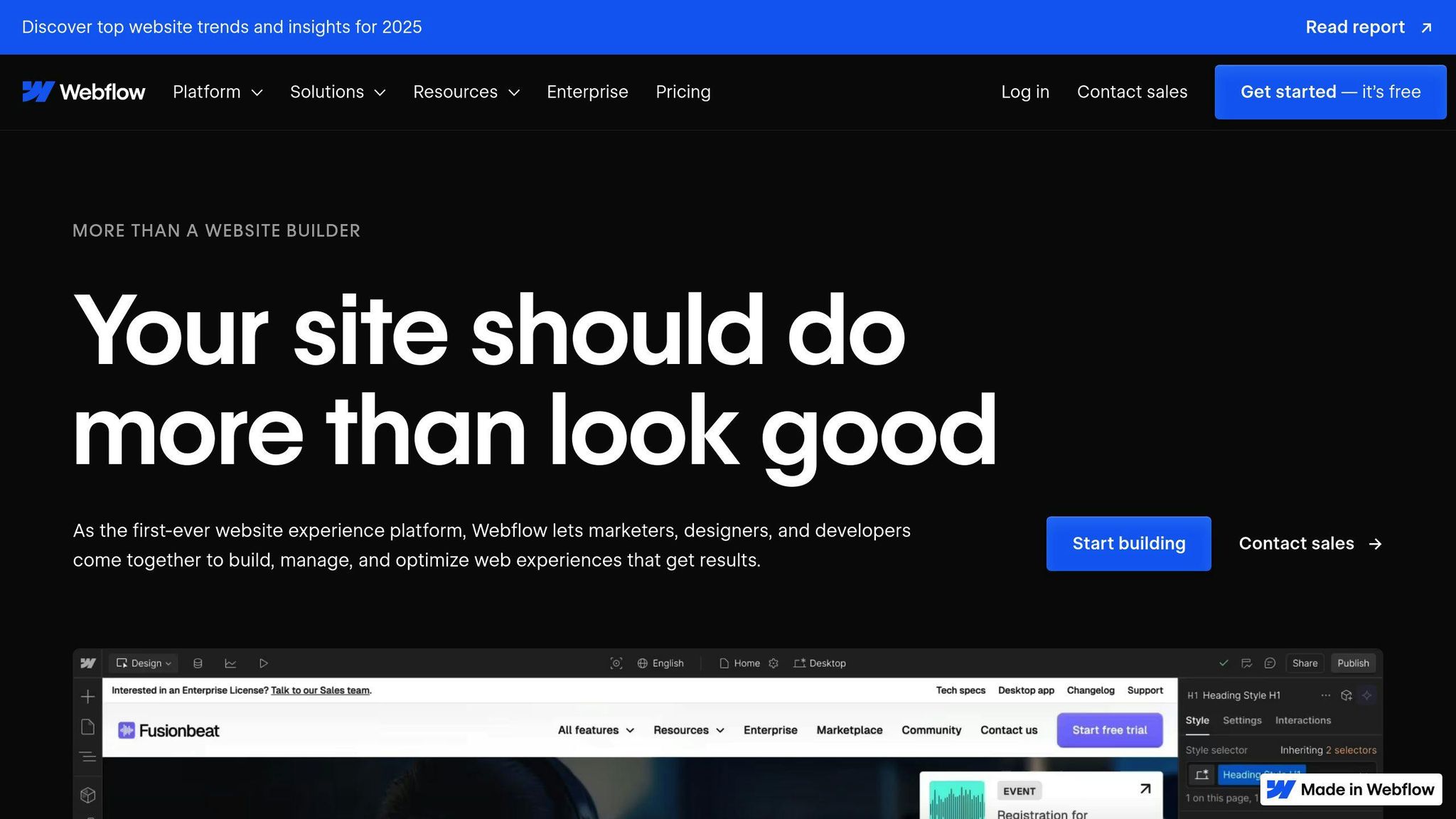
Webflow powers big names like Fiverr, Discord, and ResearchGate - and runs 0.7% of all websites. Here's what makes it a solid SEO choice in 2024:
| Feature Type | SEO Capabilities |
|---|---|
| On-Page Tools | - Custom meta titles and descriptions - Alt text management - Header tag control - Open Graph settings |
| Technical SEO | - Automatic XML sitemap generation - SSL certificates - Clean HTML/CSS code - Robots.txt control |
| Mobile Design | - Built-in responsive design - Mobile preview tools - Device-specific layouts |
| Speed Settings | - Global CDN - Image optimization - Code minification - Browser caching |
Want to know how to handle key SEO tasks in Webflow? Here's the breakdown:
| SEO Task | How to Do It | Impact |
|---|---|---|
| Meta Tags | Edit via SEO tab in settings | Better click rates |
| URLs | Set custom URLs for each page | Clear site structure |
| Mobile | Use responsive breakpoints | Mobile-first indexing |
| Speed | Enable CDN and caching | Faster load times |
Here's what you NEED to know about setting up SEO in Webflow:
1. Get the tech right first
Webflow handles the heavy lifting - XML sitemaps and SSL certificates come ready to go. Just connect your domain and you're set.
2. Make mobile your priority
Over 50% of people browse on phones. Good thing Webflow's tools make mobile-friendly design a breeze.
3. Stop duplicate content
Turn off indexing for your webflow.io subdomain. This keeps Google from getting confused between it and your main site.
For the SEO pros out there, Webflow's got extra muscle:
| Advanced Feature | Function |
|---|---|
| Schema Markup | Add structured data |
| Hreflang Tags | Manage multiple languages |
| 301 Redirects | Handle page moves |
| Search Console | Direct integration |
At $29/month for CMS features and three editors, it's not the cheapest option. But you won't need to buy extra SEO tools - everything's built right in.
Here's something cool: 18.6% of Google searches show images (2023 data). Webflow's image tools help you grab that traffic too.
4. HubSpot CMS
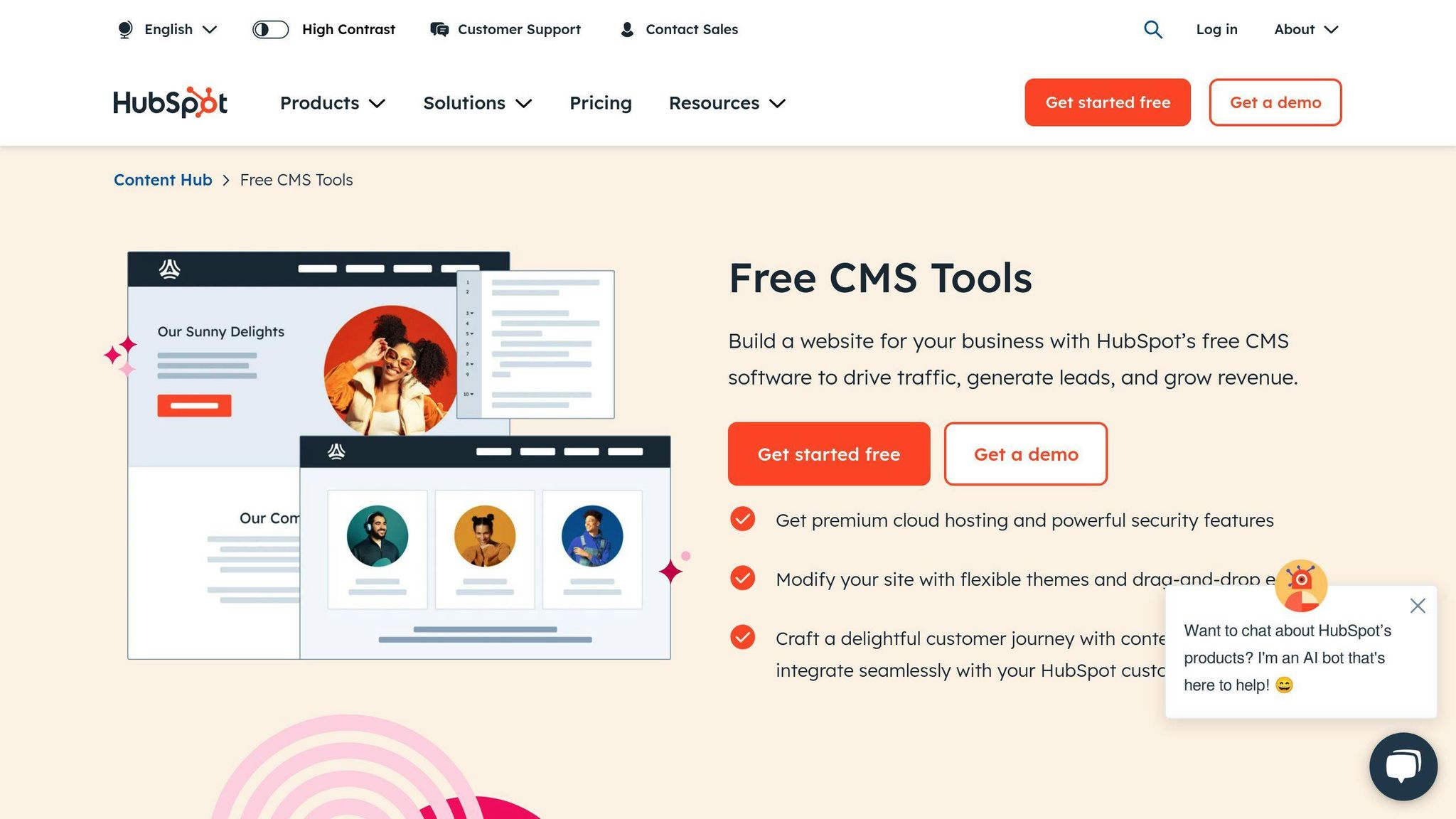
HubSpot CMS comes packed with SEO tools that make optimization simple. Here's what's inside:
| Feature Type | SEO Capabilities |
|---|---|
| On-Page Tools | - Meta title/description editor - URL structure control - Header tag management - Image alt text tools |
| Technical SEO | - Auto XML sitemap generation - Free SSL certificates - Page caching - Combined CSS files |
| Content Tools | - Real-time SEO suggestions - Keyword research integration - Content performance tracking - Semrush partnership features |
| Speed Features | - Image compression - CDN delivery - Page load optimization - Mobile performance tools |
Let's break down how SEO works in HubSpot:
| SEO Task | How To Do It | Result |
|---|---|---|
| Meta Data | Edit via "Optimize" tab | Better SERP display |
| Keywords | Use built-in research tools | Target right terms |
| Content Check | Access SEO recommendations | Fix issues fast |
| Analytics | Track via marketing dashboard | Monitor progress |
What makes HubSpot CMS different in 2024:
1. Speed comes standard
You won't need to mess with technical settings. The platform handles caching and compression automatically.
2. Real-time SEO guidance
The system checks your content as you write. It spots keyword issues and readability problems right away.
3. Clear performance data
See your rankings, traffic, and conversions in one place. No jumping between tools.
For SEO pros, HubSpot offers extra muscle:
| Advanced Tool | What It Does |
|---|---|
| Topic Clusters | Group content by theme |
| Local SEO | Optimize for area searches |
| Voice Search | Adapt for voice queries |
| Auto-Sitemap | Update site structure |
The price starts at $400/month for CMS Hub Professional. Yes, it's an investment - but you get a full marketing and CRM system too.
Here's something interesting: 84% of marketers say AI and automation boosted their SEO results. HubSpot taps into this with smart fixes and automated suggestions.
sbb-itb-79c57c5
5. Wix
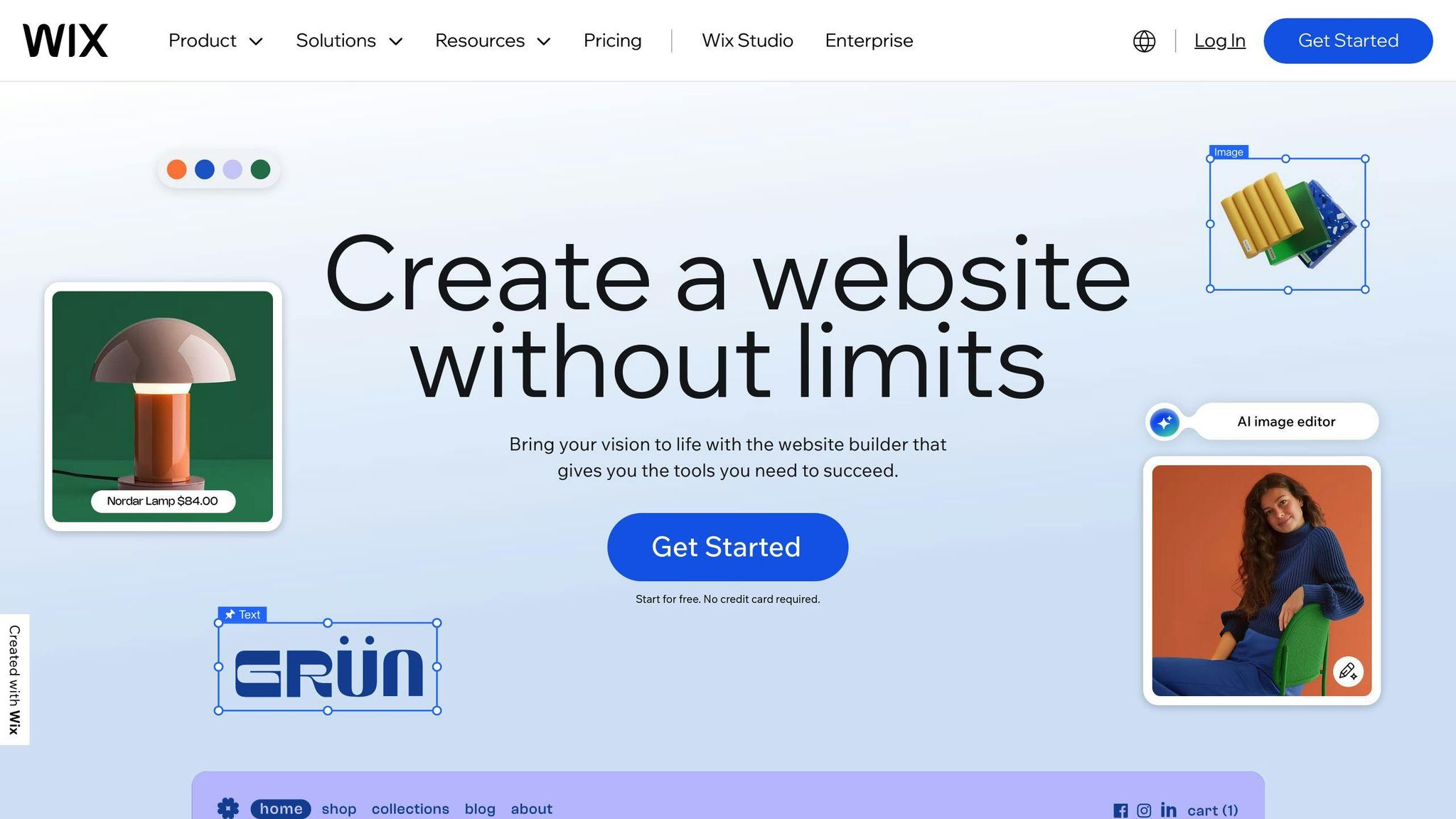
Wix has stepped up its SEO game since 2016. Let's look at what they offer in 2024:
| Feature Category | What's Inside |
|---|---|
| On-Page SEO | - Meta title/description editor - H1-H6 heading tags - Alt text for images - URL customization |
| Technical Tools | - Auto XML sitemap updates - 301 redirects - Robots.txt editor - Structured data markup |
| Mobile SEO | - Mobile editor - Auto image resizing - Layout optimizer - Speed improvements |
| Speed Features | - WebP image conversion - Wix Turbo technology - Image compression - Lazy loading |
The SEO Wiz tool is their main optimization assistant:
| Task | Function | Benefit |
|---|---|---|
| Site Analysis | Scans your website | Spots SEO issues |
| Custom Plan | Creates step-by-step guide | Shows what to fix |
| Google Setup | Connects to Search Console | Gets your site indexed |
| Progress Track | Monitors improvements | Measures success |
"Wix has been doing fantastic stuff for a number of years now. I'm impressed. They've been raising the bar not only for their services, but the industry overall." - John Mueller, Search Advocate at Google
Here's what's new in 2024:
1. Speed Performance
Wix now holds the #1 spot for mobile speed among website builders. They've multiplied sites with good Core Web Vitals scores by 10x.
2. Local SEO Features
| Feature | Purpose |
|---|---|
| Business Markup | Help local rankings |
| Review Management | Track Google reviews |
| Multi-Language | Support 180+ languages |
| Auto-Translation | Create global sites |
3. Technical Options
You can now:
- Edit canonical tags
- Set up permanent redirects
- Customize subdirectory names
- Create flat URL structures
Wix costs less than HubSpot CMS but comes with fewer marketing tools. It's a solid pick for small businesses who want simple SEO features without diving into technical details.
6. Squarespace

Here's what Squarespace offers for SEO in 2024:
| Feature Type | Available Tools |
|---|---|
| On-Page SEO | - Meta title/description editor - H1-H3 heading tags - Image captions - Custom URLs |
| Technical SEO | - Auto XML sitemaps - SSL certificates - 301 redirects - Structured data markup |
| Mobile Settings | - Auto-responsive templates - Mobile preview - Touch-friendly menus |
| Speed Options | - Image compression - Browser caching - CDN integration |
Let me break down Squarespace's main features:
1. Analytics That Matter
The built-in dashboard shows you:
- Where your traffic comes from (search, social, direct visits)
- What content performs best
- How many sales you make
- Which keywords bring visitors to your site
2. Simple SEO Setup
Getting started takes just a few clicks:
- Turn on SSL in Developer Tools
- Add SEO descriptions through the Website tab
- Set image sizes to 1500px for best results
- Enable browser caching in Advanced Settings
3. What You'll Pay
| Plan | Monthly Cost | SEO Features |
|---|---|---|
| Personal | $16 | Basic SEO tools |
| Business | $23 | Full SEO toolkit |
| Commerce Basic | $27 | + Product SEO |
| Commerce Advanced | $49 | + Advanced analytics |
"Squarespace is a good platform for SEO. It offers a user-friendly environment with built-in SEO features that can benefit users seeking simplicity and basic SEO needs." - Mehdi Aoussiad, Squarespace Web Designer and Developer
What's Missing?
| Feature | WordPress | Squarespace |
|---|---|---|
| Heading Tags | H1-H6 | Only H1-H3 |
| Alt Tags | Site-wide | Limited to captions |
| Title Tags | All pages | Main pages only |
| Meta Descriptions | All pages | Main pages only |
Bottom line: Squarespace fits small businesses and creators who want SEO without the tech headaches. It's not as flexible as WordPress, but it includes all the basic SEO tools most websites need.
7. Shopify

Here's what you get with Shopify's SEO features in 2024:
| Feature Type | Available Tools |
|---|---|
| On-Page SEO | - Meta title/description editor - Custom URLs - Alt text for images - Product page optimization |
| Technical SEO | - Auto XML sitemaps - SSL certificates - 301 redirects - robots.txt editing |
| Mobile Settings | - Mobile-ready themes - Responsive design - Touch-friendly navigation |
| Speed Features | - Global CDN - Image optimization - Browser caching |
Let's break down what matters:
1. Core SEO Features
Shopify comes with the basics built right in:
- XML sitemaps (created automatically)
- Clean URLs
- Meta data tools
- SSL security
2. Speed Stats
| Metric | Performance |
|---|---|
| Uptime | 99.9% across locations |
| CDN Coverage | Global distribution |
| Mobile Load Time | Under 3 seconds |
| Image Format | WebP support |
3. What You'll Pay
| Plan | Price | SEO Features |
|---|---|---|
| Basic | $29 | Standard SEO toolkit |
| Shopify | $79 | Advanced analytics |
| Advanced | $299 | Full reporting suite |
"53% of users bounce if a site takes more than 3 seconds to load. That's why loading speed is a big deal for Google rankings." - Phuong Nguyen, Marketing Enthusiast
The Not-So-Great Parts
| Feature | Limitation |
|---|---|
| URL Structure | Fixed subdirectory format |
| Blog Features | Basic functionality |
| Content Types | Limited customization |
| Subcollections | SEO issues with duplicates |
Bottom line: Shopify's perfect if you want solid SEO without getting lost in technical details. Yes, there are some URL limits, but the speed and mobile features make up for it.
Your SEO To-Do List
- Get your sitemap on Google Search Console
- Optimize images (size + alt text)
- Set up clear navigation
- Make product pages shine
- Link between your pages
The best part? Shopify handles the technical stuff, so you can focus on making your products look good and sell better.
CMS Features Comparison
Here's a breakdown of what each CMS platform offers for SEO:
| Feature | WordPress | Drupal | Webflow | HubSpot | Wix | Squarespace | Shopify |
|---|---|---|---|---|---|---|---|
| Market Share | 43% | 1.7% | - | - | - | - | 5.5% |
| URL Control | Full | Full | Limited | Full | Limited | Limited | Fixed Format |
| Meta Tags | Yes* | Yes | Yes | Yes | Yes | Yes | Yes |
| Mobile Support | Yes* | Yes | Yes | Yes | Yes | Yes | Yes |
| Auto Sitemaps | Yes* | Yes | Yes | Yes | Yes | Yes | Yes |
| SSL Support | Yes* | Yes | Yes | Yes | Yes | Yes | Yes |
| Image Optimization | Yes* | Yes | Yes | Yes | Yes | Yes | Yes |
| Multi-language | Yes* | Built-in | Limited | Yes | Yes | Limited | Yes |
*Needs plugins for full features
Each platform serves different needs and budgets:
| Platform | Best For | Starting Price |
|---|---|---|
| WordPress | Small to medium sites | Free (+ hosting) |
| Drupal | Large, complex sites | Free (+ hosting) |
| Webflow | Design-focused sites | $12/month |
| HubSpot | Marketing-heavy sites | $25/month |
| Wix | Small business sites | $16/month |
| Squarespace | Portfolio sites | $16/month |
| Shopify | Online stores | $29/month |
Let's look at how fast these platforms load:
| CMS | Mobile Load Time | CDN Support |
|---|---|---|
| WordPress | 2-4 seconds* | Yes* |
| Drupal | 2-3 seconds | Yes |
| Webflow | 1-2 seconds | Yes |
| HubSpot | 2-3 seconds | Yes |
| Wix | 2-4 seconds | Yes |
| Squarespace | 2-3 seconds | Yes |
| Shopify | < 3 seconds | Yes |
*Based on hosting quality and optimization
Here's what each platform offers for technical SEO:
| Feature | WordPress | Drupal | Shopify |
|---|---|---|---|
| XML Sitemaps | Auto-generated | Manual setup | Auto-generated |
| Robots.txt | Editable | Editable | Limited editing |
| 301 Redirects | Yes* | Yes | Yes |
| Schema Markup | Yes* | Yes | Basic |
| AMP Support | Yes* | Yes | No |
*Through SEO plugins like Yoast
Content management options:
| Feature | WordPress | Drupal | HubSpot |
|---|---|---|---|
| Content Types | Posts, Pages | Custom types | Custom types |
| Media Library | Basic | Advanced | Advanced |
| Version Control | Basic | Advanced | Basic |
| User Roles | 6 default | Custom | Custom |
E-commerce features for online stores:
| Feature | Shopify | WordPress + WooCommerce | Drupal + Commerce |
|---|---|---|---|
| Product Schema | Auto | Manual | Manual |
| Rich Snippets | Yes | Yes* | Yes |
| Inventory SEO | Yes | Basic | Basic |
| Review System | Built-in | Add-on | Add-on |
*Requires additional plugins
Which CMS Should You Choose?
Picking a CMS doesn't have to be complicated. Here's what works best for different websites:
| Website Type | CMS Pick | Why It Works |
|---|---|---|
| Small Business | WordPress/Wix | Simple updates, SEO tools, budget-friendly |
| Online Store | Shopify | Product SEO, reviews, stock tracking |
| Big Company | Drupal | Top security, flexible content, multiple languages |
| Marketing | HubSpot CMS | Marketing tools, data tracking |
| Portfolio | Squarespace | Clean designs, image SEO |
| Blog/News | WordPress | Content focus, categories, feeds |
Your tech skills matter too:
| Skills | CMS Options | Setup | Cost/Month |
|---|---|---|---|
| Basic | Wix, Squarespace | 1-2 days | $16-25 |
| Medium | WordPress, Shopify | 3-7 days | $29+ |
| Pro | Drupal, HubSpot | 2-4 weeks | $25-300+ |
Match your SEO needs:
| SEO Focus | CMS Pick | What You Get |
|---|---|---|
| Local | WordPress | Location tools, maps |
| Online Store | Shopify | Product data, stock tools |
| Multiple Languages | Drupal | Built-in translation |
| Content | HubSpot | Planning, tracking |
| Basic | Wix | SEO helper |
What It Costs:
- WordPress: Free CMS + hosting ($5-30/month)
- Shopify: $29/month + sales fees
- HubSpot: $25-500/month
- Wix/Squarespace: From $16/month
Tech Stuff:
- WordPress needs updates and security checks
- Drupal wants coding skills
- Wix/Squarespace handle tech for you
- Shopify manages hosting/security
Here's the bottom line: WordPress fits most SEO-focused sites. Building an online store? Go with Shopify. Need something bigger? Drupal's your best bet.
FAQs
Which CMS has the best SEO?
WordPress dominates the CMS market in 2024, running 43% of websites worldwide. Here's what you need to know about the top CMS platforms:
| CMS | Best For | Key SEO Features |
|---|---|---|
| WordPress | Blogs, Small Business | Yoast SEO plugin, URL control |
| Drupal | Large Organizations | Schema markup, Multi-language |
| Shopify | Online Stores | Product SEO, Stock tracking |
| HubSpot | Marketing Teams | Traffic insights, Keyword tools |
| Wix | Small Sites | SEO Wiz assistant |
What is the most SEO friendly CMS?
Let's break down which CMS works best for different websites:
| Website Type | Top CMS Pick | Why It Works Best |
|---|---|---|
| Government Sites | Drupal | Powers sites like NASA, eBay |
| Blogs | WordPress | 60+ million websites trust it |
| Online Stores | Shopify | Used by 2.1M stores daily |
| Marketing Sites | HubSpot | Built-in SEO tools |
| Portfolio Sites | Squarespace | Image optimization |
Here's something interesting:
WordPress isn't just the most popular CMS - it powers over 60 million websites and makes up 40% of the web. That's HUGE.
Let's look at the numbers:
| Platform | Market Share | Daily Users |
|---|---|---|
| WordPress | 64.2% | 40M+ |
| Drupal | 3% | 1M+ |
| Wix | 3.7% | Not specified |
| Squarespace | 3.1% | Not specified |